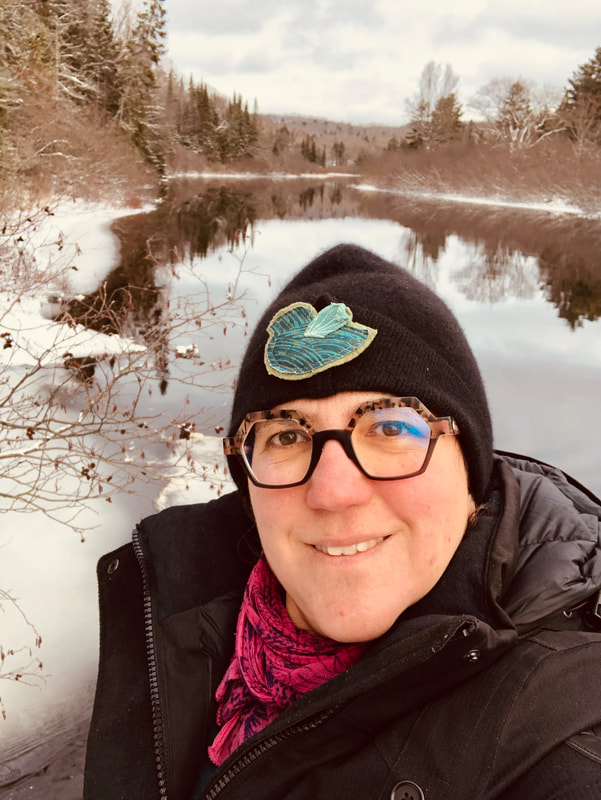|
In an unexpected turn of events, I found myself jobless in the early weeks of the COVID-19 pandemic. I am not the same person or professional I was in those early days. It was hard to tell up from down, good from bad. Despite the external circumstances I had to find a path forward. It took months and months and months.
I have uncovered a path. I created the SUSTAINABILITY STUDIO. The studio is a dynamic and playful spot where we help commercial and institutional clients make the circumstances they work in better. For individuals, teams, sectors and critically our shared ecology https://www.kadycowan.com I have been warmly welcomed into my community and I have a big line-up of individuals, teams and organizations coming into the SUSTAINABILITY STUDIO this year. They are coming to learn how to integrate ecological practice into day-to-day operations, find durable system scale solutions to intractable energy, waste, health and climate challenges and we are going to have a lot of fun doing it. At first it didn’t seem possible, however the friendship and encouragement of five #women whom I am grateful and lucky to have in my life made a huge difference. Not everyone has a #Mom that can be everything. On demand. But I do. She has given me all the lessons I need to get by. She has made the hard times better with softness and she is out in front of everyone to cheer me on when my sail finally catches some wind. My colleague Linda Varangu, who I have considered a friend for almost as long has been a guiding light to me for more than 20 years. Always willing to reach beyond the stars because she believes in me. No matter how many times I’ve been knocked down, set back, betrayed, Linda could see the bright side. When every effort I made was met with rejection, when I had poured everything out and tapped my reserve – another women showed up for me unconditionally. Victoria Mac Kinnon Gagnon. She listens to my, between a rock and a hard place stories, as often as I need to tell them. She helped me see options, gave advice abundantly, never looked back on the losses I would often share with her. She always pointed me onwards when my impulse was to retreat. During this time of uncertainty I couldn’t find my grounding the way I had in the past. In the voice of Mithra Moezzi I found my stride. She helped me make sense of mixed messages. She helped me find meaning in my own muddled thoughts. She let me hear the sound of my own words and the space to let those words settle into something else. She encouraged me to wait and see what might become of myself if I had the courage. She could see, before I could, that I had a reason and purpose and something good and worthwhile to offer. Her certainty of this fact surprised me at first. And then I started to see it too. Slowly at first, and then there was no other option but to start somewhere. My life long friend Rachel, always makes space for imperfection, honours my past like no one else, and reminds me gently and steadily, where I come from, what I have done, who I am. She is there through every transition – calmly assuring me I am worth it, I can do it, and I will survive. Thanks to these five souls, I’ve been on my own for three years now. I’ve been working on many unique and valuable projects with amazing clients and collaborators. I only take work that I believe in, and that actively contributes to building a world that I actually want to live in. In honour of women who offer limitless support to other women, I will be posting more consistently (maybe on Wednesdays?) about what is inspiring me in the SUSTAINABILITY STUDIO. If you are inspired and want to have a chat about what we are working on, or what you are working on, feel free to be in touch. I’m easy to find online. I'd love to hear if my relaunched website gives you a good idea of how we are producing connection, regeneration, decarbonization and a touch of magic in the SUSTAINABILITY STUDIO https://www.kadycowan.com
0 Comments
About 10 years ago I had the great fortune of meeting Dr. Sea Rotmann at one of my favourite conferences Behaviour, Energy and Climate Change. She was speaking about energy at a human scale, collecting data from stories, and the surprising health benefits she found in her research that came from residential energy saving upgrades in Aotearoa (New Zealand). Those were the kinds of things I was talking about in my sustainability role at one of the largest hospitals in Canada but VERY few people were listening.
Since then, Sea and I have been collaborating on all shapes and sizes of projects that help put a spotlight on the humans who are at the centre of many energy management solutions, but are often discounted. Sea's current research in association with the International Energy Agency (IEA) Technology Collaboration Programme (TCP) on hard-to-reach (HTR) energy users has produced incredible findings on energy justice, including new insights about how many people are living in "hidden" energy hardship. The need to expand the definition of hard-to-reach by including the possibility that those experiencing energy hardship may be easy-to-reach but many of our approaches have been inappropriate. Sea extended a generous invitation to me to participate in the international HTR Hui (workshop) she convened in Wellington, Aotearoa in March 2023. The Hui, in collaboration with dozens of researchers from around the world, local Māori and Pasifika experts, government and not-for-profit groups and local utilities was something really unique. Dare I say, one of the first times an IEA-TCP led project included field research, local indigenous knowledge and ample time for stories and dialogue to build relations. Working in this way shows us how we might begin to disrupt the common colonial pattern in energy research spaces of 'experts only' sharing data, outcomes and results that are disconnected from humans and community realities. Although all the other talks were focused on the target residential audiences, Sea thought my experience and practice working with institutional energy users might be complementary and I think she was right. In fact, I think the more we can share across experiences and specialities the better. I came across this brilliant question posed on Twitter by Indigenous scholar and medical doctor, Dr. Lisa Richardson. It reframes how we think about getting to what is most needed now. "How do we retain relationality in the work of transformative change within institutions, where process and policies emerge from a culture that is non-relational?" There is no book we can go to, to find what is most needed now. The solutions we seek do not exist 'out there'. We need to put in the time to build relations, make the space to build relations, meet people in their communities, listen deeply and expand our own perspectives - wether we are talking about home energy users or institutions. In my talk from a practitioner perspective I shared a few observations from my energy management work in the hospital and health care sector. I'm particularly focused on the practice of noticing patterns in large complex systems. Patterns of human behaviour, social decision making, organizational learning that either preserve the status quo (energy waste) or challenge the status quo (energy saving). This approach focuses on the world as it is and not on how we wish it were. It is especially useful if you want to put the people, the users in relation to the whole. You can see all my slides from the workshop below. If you are using these approaches already or would like to know more about them please be in touch. The saying "what gets measured gets managed" has been instrumental in helping to make energy savings a priority for individual systems like lighting, facilities, and whole sectors. Noticing energy waste by monitoring, tracking, trending, benchmarking and reporting has made energy management projects of all sizes get the expert skills, resources and planning they have always deserved.
In Ontario, we have seen incentives and energy rate structures put in place to motivate energy savings. Executive teams love the return on investment for energy projects. Energy saving lighting got everyone's attention in the early 2010s with payback on LED retrofits often under one year. For lamps that don't just provide the essential service, light, they also don't generate extra heat that needs to be removed with mechanical and energy consuming HVAC. They last longer meaning fewer service calls for replacement and often as good or better acceptance from users. This is what Dr. Beth Sawin https://www.multisolving.org/ calls MULTISOLVING. Providing solutions that address multiple challenges simultaneously. In the age of multiple disruptions, more frequent and sever weather events due to climate change, current pandemics and those on the horizon, workforce turnover and I think I will stop there...It seems obvious that solutions that MULTISOLVE should be prioritized. In energy management that poses a challenge because 'what gets measured gets managed' got us in the door and on the journey but it can't get us over the finish line because 'everything that counts can't be counted'. Now what? I have been pouring my time and attention into integrated, connected and dynamic whole solutions for over 20 years, mostly in hospitals and mostly in energy savings. There I have found durable, persistent 'sticky' solutions that are not more difficult nor more expensive to implement. For organizations, teams, sectors, who have been facing energy challenges for decades and 'have tried everything' and those just turning their attention to this topic and 'don't know where to start' there is something to be said for a MULTISOLVING approach. An approach that focuses on the needs of users and operators while working with existing constraints in the environment are my favourite. If you want to hear more about this, I'd be happy to introduce you to the Patterns in Energy Management Behaviour work. If you like it, we can work together to learn and practice MULTISOLVING to start addressing multiple challenges simultaneously. I am sure you will love it - but it might be hard to know for sure, because LOVE is top of the list of things that count but can't be counted. What do you think? Ready to try this approach with me and face some of your intractable challenges? |
Author
|


